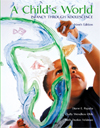Diane E. Papalia,
University of Wisconsin-Madison
Sally Wendkos Olds
Ruth Duskin Feldman
| altruism | behavior intended to help others out of inner concern and without expectation of external reward.
|
 |
 |
 |
| authoritarian | Baumrind's term for parenting style emphasizing control and obedience.
|
 |
 |
 |
| authoritative | Baumrind's terms for parenting style blending respect for a child's individuality with an effort to instill social values.
|
 |
 |
 |
| constructive play | in Piaget's and Smilansky's terminology, the second cognitive level of play, involving use of objects or materials to make something.
|
 |
 |
 |
| corporal punishment | use of physical force with the intention of causing pain, but not injury, to correct or control behavior.
|
 |
 |
 |
| discipline | methods of molding children's character and of teaching them self-control and acceptable behavior.
|
 |
 |
 |
| functional play | in Piaget's and Smilansky's terminology, the lowest cognitive level of play, involving repetitive muscular movements.
|
 |
 |
 |
| gender constancy | awareness that one will always be male or female. Also called sex-category constancy.
|
 |
 |
 |
| gender identity | awareness, developed in early childhood, that one is male or female.
|
 |
 |
 |
| gender roles | behaviors, interests, attitudes, skills, and traits that a culture considers appropriate for males or for females.
|
 |
 |
 |
| gender-schema theory | theory, proposed by Bern, that children socialize themselves in their gender roles by developing a mentally organized network of information about what it means to be male or female in a particular culture.
|
 |
 |
 |
| gender stereotypes | preconceived generalizations about male or female role behavior.
|
 |
 |
 |
| gender-typing | socialization process by which children learn appropriate gender roles.
|
 |
 |
 |
| hostile aggression | aggressive behavior intended to hurt another person.
|
 |
 |
 |
| ideal self | the self one would like to be
|
 |
 |
 |
| identification | in Freudian theory, the process by which a young child adopts characteristics, beliefs, attitudes, values, and behaviors of the parent of the same sex.
|
 |
 |
 |
| inductive techniques | disciplinary techniques designed to induce desirable by appealing to a child's sense of reason and fairness.
|
 |
 |
 |
| initiative versus guilt | Erikson's third crisis in psychosocial development, in which children balance the urge to pursue goals with moral reservations that may prevent carrying them out.
|
 |
 |
 |
| instrumental aggression | aggressive behavior used as a means of achieving a goal.
|
 |
 |
 |
| overt aggression | aggression that is openly directed at it target.
|
 |
 |
 |
| permissive | Baumrind's term for parenting style emphasizing self-expression and self-regulation.
|
 |
 |
 |
| power assertion | disciplinary strategy designed to discourage undesirable behavior through physical or verbal enforcement of parental control.
|
 |
 |
 |
| pretend play | in Piaget's and Smilansky's terminology, the third cognitive level of play, involving imaginary people or situations; also called fantasy play, dramatic play, or imaginative play.
|
 |
 |
 |
| prosocial behavior | any voluntary behavior intended to help others.
|
 |
 |
 |
| real self | the self one actually is.
|
 |
 |
 |
| relational aggression | aggression aimed at damaging or interfering with another person's relationships, reputation, or psychological well-being; also called covert, indirect, or psychological aggression.
|
 |
 |
 |
| representational mappings | in neo-Piagetian terminology, the second stage in development of self-definition, in which a child makes logical connections between aspects of the self but still sees these characteristics in all-or-nothing terms.
|
 |
 |
 |
| self-concept | sense of self; descriptive and evaluative mental picture of one's abilities and traits.
|
 |
 |
 |
| self-definition | cluster of characteristics used to describe oneself.
|
 |
 |
 |
| self-efficacy | sense of capability to master challenges and achieve goals.
|
 |
 |
 |
| self-esteem |
|
 |
 |
 |
| single representations | in neo-Piagetian terminology, first stage in development of self-definition, in which children describe themselves in terms of individual, unconnected characteristics and in all-or-nothing terms.
|
 |
 |
 |
| social cognitive theory | Albert Bandura's expansion of social learning theory; holds that children learn gender roles through socialization.
|
 |
 |
 |
| withdrawal of love | disciplinary strategy that may involve ignoring, isolating, or showing dislike for a child.
|



 2002 McGraw-Hill Higher Education
2002 McGraw-Hill Higher Education